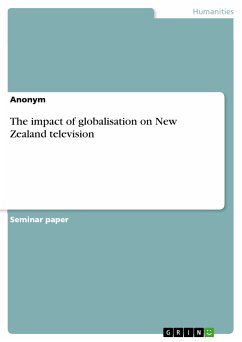Seminar paper from the year 2007 in the subject Cultural Studies - Pacific Rim, grade: 60%, School of Political, Social and International Studies (University of East Anglia (England)), course: Politics and Popular Culture, language: English, abstract: New Zealand is a small country in the southern hemisphere, close to the South Pole. It consists of two islands; the smaller North Island is the more populated one of the two; it also holds the capital and the largest city. In fact the country has ten times more sheep than inhabitants. It was the last place in the world to be settled by humans; it was also one of the last countries to get television. It is the democratic country with the most unregulated media policy. But globalisation even reaches into this part of the world… Globalisation is often political. State regulation of media and popular culture is a political tool, either to fight off or to invite globalised cultural artefacts. But also the act of exporting cultural products is political. The aim of this paper is to look at the impact of globalisation on the media industry of New Zealand. It investigates the interrelation between media policy, media ownership, and media effects. Furthermore, it examines the form and content of television programs in New Zealand. This country was selected for a case study due to its unique media regulation. Moreover, its geographic, economic, and cultural peculiarities make it an interesting case for investigation. The first part of the paper provides the theoretical background for discussing the media situation in New Zealand. It introduces and briefly discusses the major perspectives on globalisation.
Bitte wählen Sie Ihr Anliegen aus.
Rechnungen
Retourenschein anfordern
Bestellstatus
Storno









